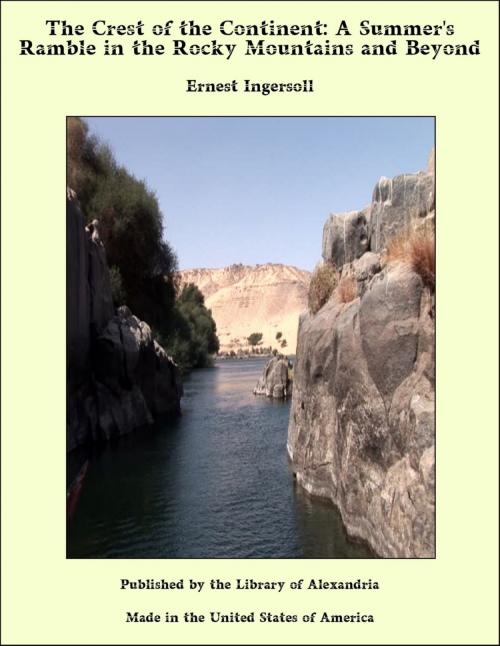The Crest of the Continent: A Summer's Ramble in the Rocky Mountains and Beyond
Nonfiction, Religion & Spirituality, New Age, History, Fiction & Literature| Author: | Ernest Ingersoll | ISBN: | 9781465622204 |
| Publisher: | Library of Alexandria | Publication: | March 8, 2015 |
| Imprint: | Language: | English |
| Author: | Ernest Ingersoll |
| ISBN: | 9781465622204 |
| Publisher: | Library of Alexandria |
| Publication: | March 8, 2015 |
| Imprint: | |
| Language: | English |
“‘There are the Rocky Mountains!’ I strained my eyes in the direction of his finger, but for a minute could see nothing. Presently sight became adjusted to a new focus, and out against a bright sky dawned slowly the undefined shimmering trace of something a little bluer. Still it seemed nothing tangible. It might have passed for a vapor effect of the horizon, had not the driver called it otherwise. Another minute and it took slightly more certain shape. It cannot be described by any Eastern analogy; no other far mountain view that I ever saw is at all like it. If you have seen those sea-side albums which ladies fill with algæ during their summer holiday, and in those albums have been startled, on turning over a page suddenly, to see an exquisite marine ghost appear, almost evanescent in its faint azure, but still a literal existence, which had been called up from the deeps, and laid to rest with infinite delicacy and difficulty,—then you will form some conception of the first view of the Rocky Mountains. It is impossible to imagine them built of earth, rock, anything terrestrial; to fancy them cloven by horrible chasms, or shaggy with giant woods. They are made out of the air and the sunshine which show them. Nature has dipped her pencil in the faintest solution of ultramarine, and drawn it once across the Western sky with a hand tender as Love’s. Then when sight becomes still better adjusted, you find the most delicate division taking place in this pale blot of beauty, near its upper edge. It is rimmed with a mere thread of opaline and crystalline light. For a moment it sways before you and is confused. But your eagerness grows steadier, you see plainer and know that you are looking on the everlasting snow, the ice that never melts. As the entire fact in all its meaning possesses you completely, you feel a sensation which is as new to your life as it is impossible of repetition. I confess (I should be ashamed not to) that my first view of the Rocky Mountains had no way of expressing itself save in tears. To see what they looked, and to know what they were, was like a sudden revelation of the truth that the spiritual is the only real and substantial; that the eternal things of the universe are they which, afar off, seem dim and faint.” There are the Rocky Mountains! Ludlow saw them after days of rough riding in a dusty stage-coach. Our plains journey had been a matter of a few hours only, and in the luxurious ease of a Pullman sleeping car; but our hearts, too, were stirred, and we eagerly watched them rise higher and higher, and perfect their ranks, as we threaded the bluffs into Pueblo. Then there they were again, all the way up to Denver; and when we arose in the morning and glanced out of the hotel window, the first objects our glad eyes rested on were the snow-tipped peaks filling the horizon.
“‘There are the Rocky Mountains!’ I strained my eyes in the direction of his finger, but for a minute could see nothing. Presently sight became adjusted to a new focus, and out against a bright sky dawned slowly the undefined shimmering trace of something a little bluer. Still it seemed nothing tangible. It might have passed for a vapor effect of the horizon, had not the driver called it otherwise. Another minute and it took slightly more certain shape. It cannot be described by any Eastern analogy; no other far mountain view that I ever saw is at all like it. If you have seen those sea-side albums which ladies fill with algæ during their summer holiday, and in those albums have been startled, on turning over a page suddenly, to see an exquisite marine ghost appear, almost evanescent in its faint azure, but still a literal existence, which had been called up from the deeps, and laid to rest with infinite delicacy and difficulty,—then you will form some conception of the first view of the Rocky Mountains. It is impossible to imagine them built of earth, rock, anything terrestrial; to fancy them cloven by horrible chasms, or shaggy with giant woods. They are made out of the air and the sunshine which show them. Nature has dipped her pencil in the faintest solution of ultramarine, and drawn it once across the Western sky with a hand tender as Love’s. Then when sight becomes still better adjusted, you find the most delicate division taking place in this pale blot of beauty, near its upper edge. It is rimmed with a mere thread of opaline and crystalline light. For a moment it sways before you and is confused. But your eagerness grows steadier, you see plainer and know that you are looking on the everlasting snow, the ice that never melts. As the entire fact in all its meaning possesses you completely, you feel a sensation which is as new to your life as it is impossible of repetition. I confess (I should be ashamed not to) that my first view of the Rocky Mountains had no way of expressing itself save in tears. To see what they looked, and to know what they were, was like a sudden revelation of the truth that the spiritual is the only real and substantial; that the eternal things of the universe are they which, afar off, seem dim and faint.” There are the Rocky Mountains! Ludlow saw them after days of rough riding in a dusty stage-coach. Our plains journey had been a matter of a few hours only, and in the luxurious ease of a Pullman sleeping car; but our hearts, too, were stirred, and we eagerly watched them rise higher and higher, and perfect their ranks, as we threaded the bluffs into Pueblo. Then there they were again, all the way up to Denver; and when we arose in the morning and glanced out of the hotel window, the first objects our glad eyes rested on were the snow-tipped peaks filling the horizon.















